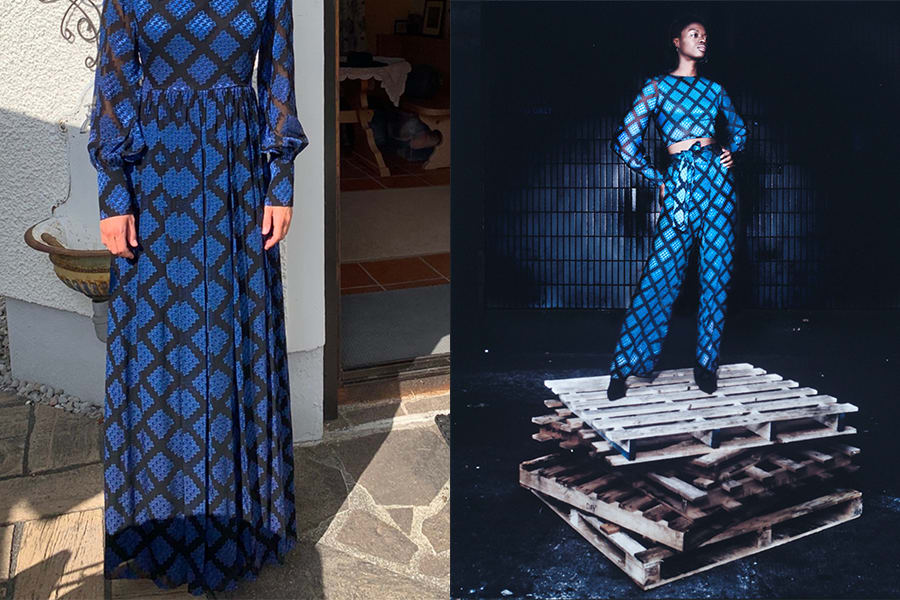
An interview with RETURE founder Nina Van Volkinburg
- Written byM. Fields
- Published date 07 June 2021

How many times have you wanted to breathe life into that vintage piece you haven’t worn in a while? Or are you thinking about getting rid? With upcycling becoming a more standard practice within fashion retail, RETURE is aiming to cement itself as a network that encourages sustainable fashion practices from designers and consumers alike.
Billing itself as “the world’s first premium fashion upcycling platform”, RETURE aims to simplify the upcycling processes by allowing customers to connect directly with a designer that meets their requirements. We had a chat with LCF Fashion Marketing lecturer Nina Van Volkinburg, the founder of RETURE, about the inspiration behind the platform, as well as her thoughts on the future of upcycling in fashion retail.
First of all, what is the meaning behind the brand name?
It's about bringing recycling and couture together. Couture isn't necessarily about the luxury aspect, it's about craft, and that's our priority - to really spotlight the craft of our design community. The recycling takes garments that we already have in our wardrobes and gives them a new life through craft. That’s how the name was established.
Was there a specific event that caused you to launch RETURE?
I started the company in March 2020. I was brainstorming months before then, because it was in line with my research, but actually building the platform with my co-founders aligned with when we went into lockdown. On one hand, there was more time to really focus on establishing the business, but at the same time, you're just constantly reading how the fashion supply chain has been completely disrupted, and a lot of designers were dropped by wholesalers. What started as an idea became more of a need, and we want to support the community the best we can.
What are some of your own experiences of losing a garment to the depths of your wardrobe, or wear and tear?
Most of my garments are quite old. I'm an only child so my mom gives me pieces, my grandma gives me pieces. I've upcycled quite a few myself and have had things repaired.
One piece I upcycled belonged to my neighbour in Austria. She's in her 80s, and she had this wonderful ball gown she wore to casino nights and fancy occasions. It was hung in my wardrobe for five years. This year I worked with Anna Schuster, an LCF graduate, and she turned it into these great flares and a crop top that I can’t wait to wear.
Instead of just having that being a dead weight in your wardrobe, you can revive it - that's kind of the message that we just want to make clear to everybody.

From a sartorial point of view, what makes bespoke clothing so important to you?
I've always been healthily obsessed with fashion, always reading I-D, Vogue and Dazed. I loved the meaning behind clothes, who was making the clothes and these age old traditions of handicraft.
I did a Masters in Strategic Fashion Marketing at LCF, and that really opened my eyes into the world of fashion. I was really intrigued by how the industry was changing from the aspect of technology and how social media and AI really changed the way people work, good and bad. It led me to do a PhD, and that research allowed me to speak to a lot of emerging designers, especially in the UK, and I got to understand the challenges that they're facing in today's climate.
Do you see up-cycling taking over the fast fashion landscape and possibly ending up on the high street, for example?
I definitely see fast fashion not being the norm in 10 years’ time, because resale is growing seven times faster than fast fashion, and rental is booming too. Upcycling, as we're talking about here, is niche today, but it's going to become a normalised activity in the next few years. All that together will replace the fast fashion model.
It’s interesting for H&M to actually invest in this for example - they have launched an upcycling machine where you put in a T shirt, and then it can actually turn it into a pair of socks. It makes sense for any consumer because we all have this material, which is an inconvenience for it to be sitting around, while we’re constantly buying more and more and more.
RETURE was Co-founded by London College of Fashion lecturer Nina Van Volkinburg, PhD, former Google executive Robin Williamson, PhD and computer scientist James Williamson. Membership is currently by invite only.
- Follow LCF on Social Media
- Keep up to date with the UAL Coronavirus page
- What’s on at LCF: open days and events